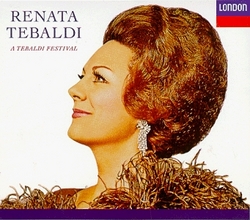| All Artists: Richard [Classical] Wagner, Georges Bizet, Camille Saint-Saens, Jules Massenet, Giuseppe Verdi, Giacomo Puccini, Gioachino Rossini, Agustin Lara, Manuel Ponce, Salvatore Cardillo, Paolo Tosti, Ernesto de Curtis, Richard Rodgers, Vincenzo Bellini, Anton Guadagno, Richard Bonynge, Fausto Cleva, New Philharmonia Orchestra, Monte Carlo National Opera Orchestra, Renata Tebaldi Title: Renata Tebaldi: A Tebaldi Festival Members Wishing: 0 Total Copies: 0 Label: Decca Release Date: 9/16/1997 Genres: Pop, Soundtracks, Classical Styles: Vocal Pop, Opera & Classical Vocal, Historical Periods, Modern, 20th, & 21st Century Number of Discs: 2 SwapaCD Credits: 2 UPC: 028945245621 |
Search - Richard [Classical] Wagner, Georges Bizet, Camille Saint-Saens :: Renata Tebaldi: A Tebaldi Festival
 | Richard [Classical] Wagner, Georges Bizet, Camille Saint-Saens Renata Tebaldi: A Tebaldi Festival Genres: Pop, Soundtracks, Classical
|
Larger Image |
CD Details |
CD ReviewsTEBALDI - HER TRIBUTE TO HER FANS! F. Barton | Newport, WA USA | 02/22/2000 (5 out of 5 stars) "The other review here ONLY focuses on the unreleased material on this set, which was NOT included in it's original release in 1969. The reason Tebaldi had these "out of character" arias suppressed was that she wanted them released on her 75th birthday, and they were. I STILL think her "Casta Diva" surpasses Sutherland, who is an exquisite singer, but almost completely lacking emotion. The WHOLE of this CD set however is the ORIGINAL album, which was made for her fans. Her "swansong" of sorts, if you will. The Wagner arias could not be more beautifully sung in ANY language, Same for the Samson arias. Also the "encore" arias, including a tremendous "Grenada", how many times have you heard a woman sing this? "If I Loved You" is the most beautiful rendition I have EVER heard, and would make Rogers and Hammerstein even MORE proud of their composition. All of my friends who have bought this set agree, it's wonderful. The 5 other tracks are "bonus" ones, and should NOT be confused with the album as originally released. In the original album's context, her voice is incredible, doing such magical things, that even the orchestra applauded after a "take." Take my word, or ask a friend; this won't be off your player for a LONG time. Tebali-ites MUST have this in their collection, as it proves, to everyone, that her voice had risen to incredible heights, even this late in her career. Even Tebaldi said, "I want to be remembered for THIS singing." I could recommend lots of others, however this 2CD set is unique, and unlike any other Renata Tebaldi put out. Her CARMEN arias are superb, no matter WHAT the language." A new side of a great singer 09/18/2001 (5 out of 5 stars) "Tebaldi is my favortie singer and this is one of my favorite of her recordings. I had the original release when it came out and enjoyed if very much . . . particularly playing the "Liebestod" and challenging someone to identify the voice. However, when the CD came out, I was surprised and delighted to find other "goodies" on it that I had not recalled from the LP's. They are WONDERFUL -- particularly the "Casta Diva" and "O Don Fatale" -- wouldn't it be great to hear a mezzo sing that with such blazing high notes! The Nabucco aria is not a favorite and is not what I would judge the set by but the other "new" material is well worth having and enjoying . . . and of course the original material is likewise." Tebaldian all the way! Andrew Coffill | Chicago, Il. USA | 09/29/2001 (4 out of 5 stars) "A lot of peolpe I talk to about this album are skeptical about it, saying that she shouldn't have made it, but then my response usually is, "Well where else are you going to hear her sing some of these selctions, which I think are better than other singers' interpretations?!!" You will not be able to hear her do the mad scene from Puritani, Casta Diva, or anything from Nabucco on any other CD of hers-end of story!! True, she may have been past her prime, but so was the "rival"(Callas)which didn't seem to stop her for the next 20 years, and seeing as how Tebaldi lasted for 30 years+ by being careful not to damage her instrument, as opposed to Callas' 13 years of complete misuse...well, need I say more? Enjoy!"
|

 Track Listings (12) - Disc #1
Track Listings (12) - Disc #1